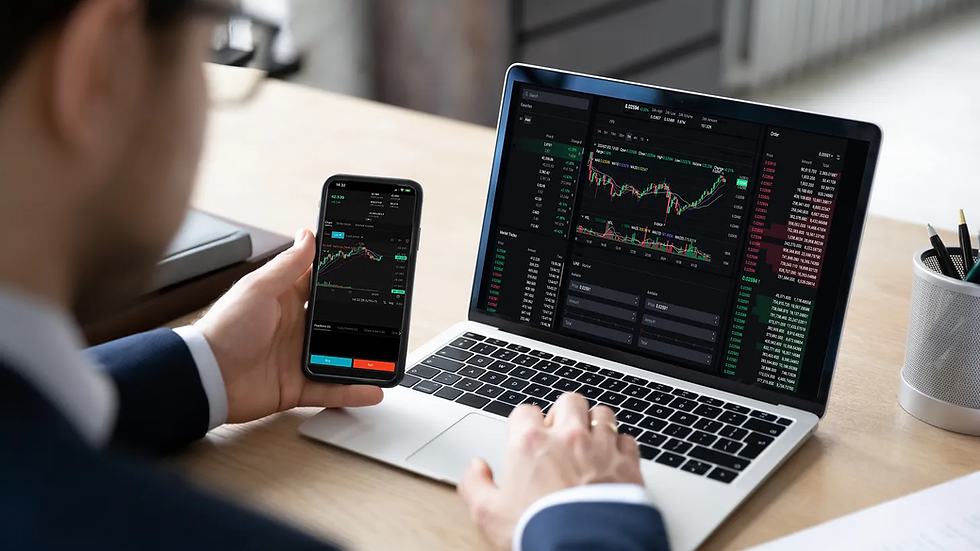Drowning In It
- dthenry5
- Oct 2, 2025
- 4 min read
Put a gun to my head, I couldn’t tell you what the FTSE is trading at today. I know it’s gone up by a fair bit and I’m pretty sure it is at an all time high, but I couldn’t say what level definitively.
Now probably to some of you that is tantamount to heresy. “Are you not even keeping an eye on it”? Well, like, sort of. A bit.
But let’s be honest here - what good does it really do anyway?
Every morning I put on my Apple Watch to monitor how many steps I take during the day. Use an app to track the meals I eat. Log all of my workouts on Strava.
Stats are brilliant, love stats. Big fan of stats over here. I find it very cool that I can get real time live feedback on “how I’m doing” (usually badly) in any given day, at any given time.
But with all this data available to us, there is a point where it begins to offer diminishing returns.
During COVID I bought one of those “Whoop” bands you see the golfers wearing to track heart rate, workouts and sleep.
And it gave awesome feedback, but after a certain point in time you don’t need a fancy canvas wristband to tell you that your sleep is going to suffer after a few pints or a stressful day. We know this instinctively anyway.
But in all of the noise, sometimes the useful stuff can get lost.
Where excess access to information also creates the potential for tangibly worse outcomes, then we need to be very careful.
The investor class have never had it so good in terms of the information they have available to make decisions. There is a bull market in transparency.
Increasingly sophisticated investment platforms offering real time stock prices, research, charts - everything the amateur investor could wish for. All you have to do is make eye contact with your phone and you’re in.
Podcasts and blogs and YouTube videos offering advice on almost any financial topic you can think of. There are a lot of people whose livelihoods depend on their constant opining on what the market is ‘doing’ - and the market, largely, gobbles it up with an insatiable demand for #content.

And despite all this information (or maybe because of it) investors continue to make just as many bad decisions as they have done in the past.
Part of this is surely human nature, which will never change. But if technology companies have learnt one thing over the past twenty years, it is how to get and keep us all engaged.
And these tricks are particularly useful to finance companies whose business model demands you constantly be “doing something” with your money. Buying and selling, trading and tinkering.
These platforms feed on our innate bias towards action - that if we put in more effort and just do more stuff as an investor we will surely get a better outcome.
WRONG.

The good news for us (I guess) is a lot of professional investors face exactly the same challenges, but on steroids.
Take a tour of the floor of any investment firm in the City and you will see rows and rows of market screens showing prices for any asset you could dare to dream of, live and in real time.
The irony being of course that a lot of these companies will market themselves as “buy and hold” investors. Patience, discipline and all that.
And yet they feel that each and every investor in the firm needs to be constantly “keeping an eye” on it.
If we agree, you and I, that all of us have innate biases that mean our default setting is to make bad investing decisions - then we can see how this onslaught of information can be a recipe for disaster.
Who does this actually help? What is it for? If it doesn’t help practitioners make better decisions, then it can’t be for the benefit of the end investor. Surely, therefore, a large element must be purely performative.
Unless your investment time horizon is a few minutes, there is absolutely no need for you to have access to live pricing.
Most research reports and stock tip columns are garbage/self-serving/self-serving garbage. You’re better off cutting the grass.
The FTSE is going to do what the FTSE is going to do, regardless of whether I am watching it or not.
The market couldn’t care less about how much effort you put in, how ‘on top of it’ you stay - and it sure as shooting doesn’t care whether you pay for a Bloomberg terminal or not. It’s not really ‘fair’ in that way.
By the time something truly major happens, it is too late anyway - it’s not like any of us have the tools to react before the wider market does. As retail investors that simply cannot be a game we choose to engage in. We would be bringing a spoon to a gunfight.
If you are managing your own money, then deciding upon which investment platform to use is an important decision. Most will advertise the kind of bells and whistles I refer to above like it is a “good thing”.
But, based on what we know, maybe a low cost “nuts and bolts” platform offering the bare bones is the way to go to get a great outcome. And surely that is all it is worth anyone caring about?
Past performance is not indicative of future returns. None of the above is intended to constitute advice to any one individual. If you have questions regarding your individual situation, then please consult with a regulated financial adviser.



Comments